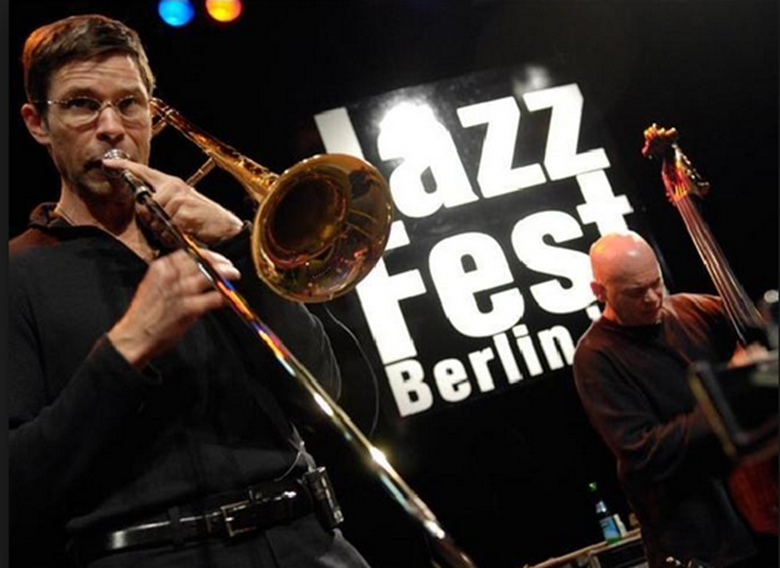Big bands lead the celebrations at Berlin JazzFest 2013
Wednesday, December 4, 2013
In German the word ‘Feier’ means ‘celebration’.

Add it to ‘Abend’ (‘evening’), mind, and the resultant ‘Feierabend’ refers to the daily ‘time to stop work’, the end of a shift rather than the start of a party. Berlin seems to take the word more literally, however, and in a capital lacking capital but famous for its rich nocturnal culture there was no danger of its annual JazzFest going gentle into any kind of night, good or otherwise. It was London's MOBO-crowned Sons of Kemet who brought the "fire" music and the ‘Feier’ atmosphere to this year's closing moments and an after-hours Quasimodo club duly drank it up while the first signs of winter waited patiently outside. There was subtlety too to this final gig: you could hear the proverbial ‘Stecknadel’ drop during one mesmeric solo clarinet cadenza while at other times the group's ‘flat-lining’ – a term bandleader Shabaka Hutchins uses to describe their collective grooves – hypnotised the Sunday crowd.
Revelry was also in the air on Friday night, as one of East Germany's most important free jazz musicians Ernst-Ludwig Petrowsky held an early 80th birthday jubilee at the Akademie der Künste. The audience of friends and musicians joined three of his most important bands – including the pioneering '70s Zentralquartett - to party big into the wee small hours. And there was dancing in the stalls at the Barbican-like Haus Der Berliner Festspiele on Saturday as J.B.'s trombonist Fred Wesley – funk royalty for sure – sat magisterial on a stool, all in black save for a pair of silver trainers, "breaking bread with his momma" and inviting us to join his House Party. Great though this was, one wishes he'd arrived without the company of Abraham Inc. whose attempts to blend jazz, hip hop and klezmer were (David Krakauer's exhilarating clarinet work aside) ultimately, and a little-painfully, unhip.
The presence of the city's character in the festival was made more overt in the premiere of Gebhard Ullman's Berlin Suite, a multi-movement work in which samples from Turkish markets, snatches of local radio and sounds from the streets blended with the local reedman's swinging melodies and passages of open improvisation. Hopping on and off themes and passing through contrasting textures the octet might like to have wandered a little more freely without the time-pressures of a festival set but it was an intriguing and exciting tour nonetheless. The mix of nationalities and cultures typical of today's Berlin was in evidence too with Joachim Kühn and Pharaoh Sanders offering "Gnawa Jazz Voodoo" in combination with six North African musicians.
But what of the presence of the festival in the city? No Montreal-style street closures involved here (it'd need to be Miles Davis back from the dead to make a person stand that long in that wind) and JazzFest Berlin lacks London's sense of total town takeover, somewhat camouflaged as it is within four venues on the Western corner of leafy Tiergarten park. But a variety of big names (Americans in particular) and range of styles (from bop and swing to ambient soundscape) were always going to be enough to bring sell-out crowds to Charlottenburg: Jaimeo Brown's Transcendence lullaby-ed and rocked a busy Seitenbühne, Dafnis Prieto's Proverb Trio found spontaneous riffs and improvised dancefloor grooves in the same room, and Christian Scott brought his breakneck "stretch music" to the main stage, blending Dizzy-esque technique and showmanship at dizzying speeds (the opening Jihad Joe set off at an unbelievably fast tempo!).
Bernt Noglik stated that his second festival as artistic director was about celebrating jazz as ‘the sound of surprise’. Doing the phrase justice at the A-Trane club, Riccardo Del Fra composed unanticipated angles from which to view oft-seen standards in two nights of ‘My Chet, My Song’. The bassist's astonishing interactions with one-to-watch drummer Jonas Burgwinkel were a joy-to-watch, almost (but not quite) as fun as saying the latter's surname again and again. In this year's last concert-house performance John Scofield and his Uberjamband were on uber-polished popular form while their warm-up act – Monica Roscher's young 18-piece ensemble - provided more edgy, unusual sounds in a set comprising curveball pop songs and adventurous structures. On an equally large scale, keyboardists Michael Wollny and Tamar Halperin – who first collaborated as the ‘Wunderkammer’ duo in 2009 – presented their live big band reworking of the project. It was not swing or improvisation that amazed here but rather a spirit of childlike surprise akin to discovering a door into Jazz Narnia at the back of said ‘Cabinet of Wonders’, a place where icy moto-perpetuo harpsichords and frozen minimalist textures abounded and marching brass armies sounded ominous in the distance.
It was into not quite such a drastic landscape that groups of late-leaving fauns stumbled on the first Monday morning of November; but had it been, JazzFest Berlin 2013 had produced more than enough warmth and energy to get everyone safely home.
– Phil Smith